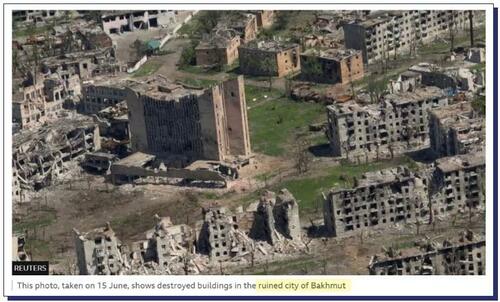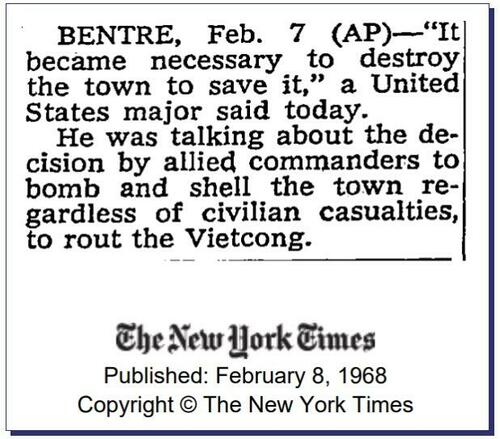
Authored by Mike Shedlock via MishTalk.com,
What’s the US goal in Ukraine? Is it doable? What about Russia’s goal? Ukraine’s?
The lead image is from the BBC article ‘People call us the Ghosts of Bakhmut’
Minus the troops, the setup in Ukraine is starting to look like the US fiasco in Vietnam, in Afghanistan, and Iraq.
None of hose actions had a clearly defined mission that was remotely achievable. Ukraine doesn’t either.
What is the US Mission?
-
Stop Russia
-
Win back all the territory Ukraine lost?
-
Get Ukraine in NATO?
If the mission is for Ukraine to win back all lost territory, then progress is torturously slow and haphazardly thought out.
Supplying more weapons could help. But the expense could be a nuclear response by Putin.
Is the mission to stop Russia’s advance? If so, that is not compatible with Ukraine’s goal of winning back 100% of the territory it lost.
To what extent is the US willing to keep paying for Ukraine’s goal if the US goal is not the same?
Russia’s initial thrust was to put a puppet regime in Kyiv, but that failed. Does anyone know what Russia’s goal is at this point?
Perpetual War
After many months and at great cost Russia finally captured the Ukrainian city of Bakhmut. The city was totally destroyed in the process. Now Ukraine is struggling to win it back.
This reminds me of fighting over meaningless hills just like the US did in Vietnam.
Journalist Peter Arnett’s Vietnam dispatch for the Associated Press: “It became necessary to destroy the town to save it.”
On Feb. 10, an Oregon newspaper rendered it “We had to destroy the village in order to save it.” Two weeks later the St. Louis Post-Dispatch reported on a group of protesters carrying a banner that read, “It Was Necessary to Destroy the Village in Order to Save It.” In whatever form, the words had become a mantra of the anti-war movement, a quick and simple summary of what was wrong with the entire Vietnam adventure.
Arnett has always been adamant that he got the quote right, and I have no reason to doubt him. Still, I would be remiss if I failed to note that there are skeptics.
Peace for Territory?
Any time the US or EU brings up the notion of peace for territory, Ukraine’s president Volodymyr Zelenskyy goes off the rails, frequently accompanied by the battle cry, “We cannot reward Putin”.
At best, there are three conflicting goals, none of which is clearly defined other than Ukraine’s.
Complicating matters, Ukraine’s goal is not remotely achievable without massive US spending and risk of a nuclear confrontation with Putin.
Meanwhile, a stalemate can go on for quite a while, perhaps with a debate over the shape of the negotiating table.
That may sound ridiculous, but a lengthy debate over the shape of the table happened in the Vietnam War Peace Negotiations
Vietnam Peace Talks
One of the largest hurdles to effective negotiation was the fact that North Vietnam and the National Front for the Liberation of South Vietnam (NLF, or Viet Cong) in the South, refused to recognize the government of South Vietnam; with equal persistence, the government in Saigon refused to acknowledge the legitimacy of the NLF. Harriman resolved this dispute by developing a system by which North Vietnam and U.S. would be the named parties; NLF officials could join the North Vietnam team without being recognized by South Vietnam, while Saigon’s representatives joined their U.S. allies.
A similar debate concerned the shape of the table to be used at the conference. The North favored a circular table, in which all parties, including NLF representatives, would appear to be “equal”‘ in importance. The South Vietnamese argued that only a rectangular table was acceptable, for only a rectangle could show two distinct sides to the conflict. Eventually a compromise was reached, in which representatives of the northern and southern governments would sit at a circular table, with members representing all other parties sitting at individual square tables around them.
Can’t Leave Now
This takes me back to 7th grade memories when our teacher, Harry Don Wirth left mid-year for Vietnam. I recall him saying something to the effect “I don’t think we should be there, but we can’t leave now.”
The war was still going on when I graduated high school and two more years on top of that.
The US was in Vietnam for 8 years and Afghanistan for 20 years. What good became of either of them?
Eventually, the US left both countries, humiliated .
In this case, we don’t have troops in Ukraine, but we happily supply missiles. Importantly, it was US meddling in Ukraine in 2014, led by Senator John McCain and the CIA, that led to the mess we are involved in now.
That does not excuse Putin, but history is clear. US meddling in foreign affairs of other nations never leads to anything good.
Prolonged War is Inflationary
Ukraine in not in any position to be demanding anything from us. But without clearly defined goals, we keep cruising down the path of a prolonged if not perpetual war, with escalating costs.
It’s yet another inflationary aspect of US policy.
Also see Yet Another Biden Regulation Will Increase Costs and Promote More Inflation and my follow-up post The Cost of Soup is About to Increase, Thank President Biden
* * *
Authored by Mike Shedlock via MishTalk.com,
What’s the US goal in Ukraine? Is it doable? What about Russia’s goal? Ukraine’s?
The lead image is from the BBC article ‘People call us the Ghosts of Bakhmut’
Minus the troops, the setup in Ukraine is starting to look like the US fiasco in Vietnam, in Afghanistan, and Iraq.
None of hose actions had a clearly defined mission that was remotely achievable. Ukraine doesn’t either.
What is the US Mission?
If the mission is for Ukraine to win back all lost territory, then progress is torturously slow and haphazardly thought out.
Supplying more weapons could help. But the expense could be a nuclear response by Putin.
Is the mission to stop Russia’s advance? If so, that is not compatible with Ukraine’s goal of winning back 100% of the territory it lost.
To what extent is the US willing to keep paying for Ukraine’s goal if the US goal is not the same?
Russia’s initial thrust was to put a puppet regime in Kyiv, but that failed. Does anyone know what Russia’s goal is at this point?
Perpetual War
After many months and at great cost Russia finally captured the Ukrainian city of Bakhmut. The city was totally destroyed in the process. Now Ukraine is struggling to win it back.
This reminds me of fighting over meaningless hills just like the US did in Vietnam.
Journalist Peter Arnett’s Vietnam dispatch for the Associated Press: “It became necessary to destroy the town to save it.”
On Feb. 10, an Oregon newspaper rendered it “We had to destroy the village in order to save it.” Two weeks later the St. Louis Post-Dispatch reported on a group of protesters carrying a banner that read, “It Was Necessary to Destroy the Village in Order to Save It.” In whatever form, the words had become a mantra of the anti-war movement, a quick and simple summary of what was wrong with the entire Vietnam adventure.
Arnett has always been adamant that he got the quote right, and I have no reason to doubt him. Still, I would be remiss if I failed to note that there are skeptics.
Peace for Territory?
Any time the US or EU brings up the notion of peace for territory, Ukraine’s president Volodymyr Zelenskyy goes off the rails, frequently accompanied by the battle cry, “We cannot reward Putin”.
At best, there are three conflicting goals, none of which is clearly defined other than Ukraine’s.
Complicating matters, Ukraine’s goal is not remotely achievable without massive US spending and risk of a nuclear confrontation with Putin.
Meanwhile, a stalemate can go on for quite a while, perhaps with a debate over the shape of the negotiating table.
That may sound ridiculous, but a lengthy debate over the shape of the table happened in the Vietnam War Peace Negotiations
Vietnam Peace Talks
One of the largest hurdles to effective negotiation was the fact that North Vietnam and the National Front for the Liberation of South Vietnam (NLF, or Viet Cong) in the South, refused to recognize the government of South Vietnam; with equal persistence, the government in Saigon refused to acknowledge the legitimacy of the NLF. Harriman resolved this dispute by developing a system by which North Vietnam and U.S. would be the named parties; NLF officials could join the North Vietnam team without being recognized by South Vietnam, while Saigon’s representatives joined their U.S. allies.
A similar debate concerned the shape of the table to be used at the conference. The North favored a circular table, in which all parties, including NLF representatives, would appear to be “equal”‘ in importance. The South Vietnamese argued that only a rectangular table was acceptable, for only a rectangle could show two distinct sides to the conflict. Eventually a compromise was reached, in which representatives of the northern and southern governments would sit at a circular table, with members representing all other parties sitting at individual square tables around them.
Can’t Leave Now
This takes me back to 7th grade memories when our teacher, Harry Don Wirth left mid-year for Vietnam. I recall him saying something to the effect “I don’t think we should be there, but we can’t leave now.”
The war was still going on when I graduated high school and two more years on top of that.
The US was in Vietnam for 8 years and Afghanistan for 20 years. What good became of either of them?
Eventually, the US left both countries, humiliated .
In this case, we don’t have troops in Ukraine, but we happily supply missiles. Importantly, it was US meddling in Ukraine in 2014, led by Senator John McCain and the CIA, that led to the mess we are involved in now.
That does not excuse Putin, but history is clear. US meddling in foreign affairs of other nations never leads to anything good.
Prolonged War is Inflationary
Ukraine in not in any position to be demanding anything from us. But without clearly defined goals, we keep cruising down the path of a prolonged if not perpetual war, with escalating costs.
It’s yet another inflationary aspect of US policy.
Also see Yet Another Biden Regulation Will Increase Costs and Promote More Inflation and my follow-up post The Cost of Soup is About to Increase, Thank President Biden
* * *
Loading…






